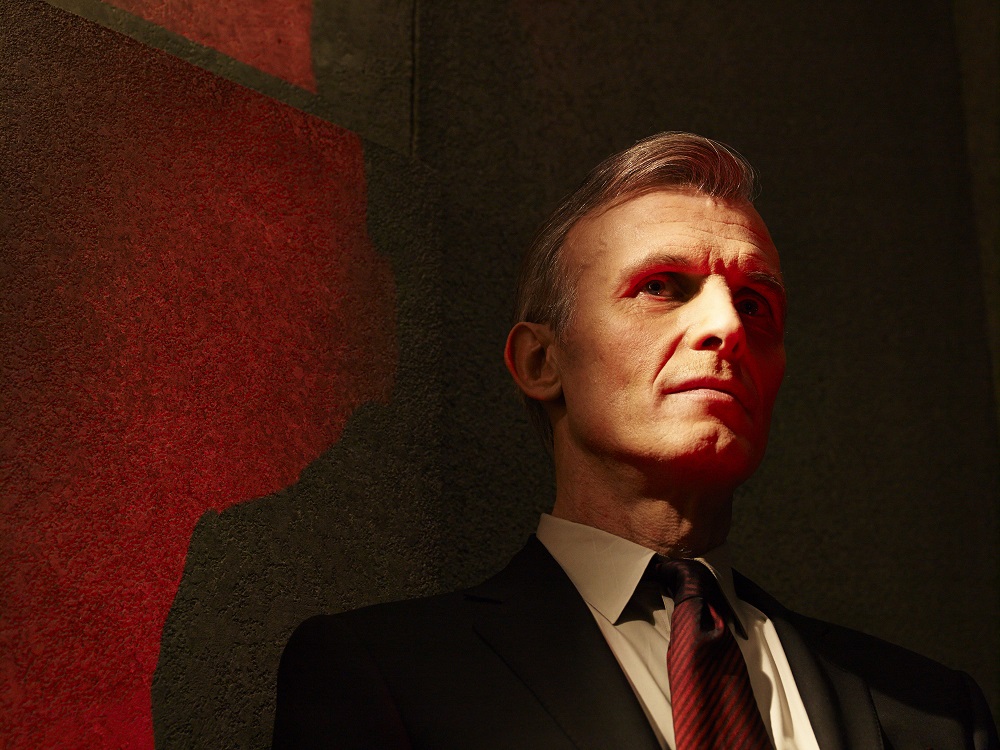July 21, 2014

Thomas Eichorst (Richard Sammel)
When “The Leftovers,” HBO’s adaptation of Tom Perrotta’s novel about a small town dealing with the aftermath of an event rather like the Rapture, premiered last month, I wrote that it was bringing conventional morality back to cable. The show was concerned with the everyday struggle to be a good person in the aftermath of millions of devastating losses.
“The Strain,” an adaptation of Guillermo del Toro and Chuck Hogan’s vampire books, which premiered last weekend on FX, is not as serious as “The Leftovers.” But even so, the pulpy vampire drama about Centers for Disease Control and Prevention scientist Ephraim Goodweather (Corey Stoll) trying to control an outbreak of vampirism in Manhattan with the help of Holocaust survivor Abraham Setrakian (David Bradley) is an appropriate summer counterpart to “The Leftovers.” Where “The Leftovers” values the effort to be decent, “The Strain” gives us a vision of powerful, unambiguous evil.
It is a striking contrast not just to the vampires who have graced our screens as romantic heroes in recent years, but to the strain of dramas that have equated moral sophistication with sympathy for repulsive people. Or, as FX chief executive officer John Landgraf put it to television critics on Monday, “These are disgusting, parasitic, awful worm-bearing vampires.”
In “The Strain,” a vampire’s attack is not ravishment. It looks more like rape, like being eaten alive by wild animals. Thick, fleshy stingers jut forward from vampires’ unhinged jaws, burrowing into their terrified prey. The swarming, dissected undead of “The Strain” converge on a scientist like the wild dogs devouring a deer in the pilot episode of “The Leftovers.”
When you are turned in “The Strain,” you do not sparkle or acquire an unnatural beauty. Instead, you begin to rot. One young girl who has been bitten crouches in dirty, long-cold bathwater. An infected rock star bites a woman during sex and finds himself licking the trail of blood she leaves behind off a dirty floor, ravenous for the taste. Once you are turned, your genitals atrophy and your body reshapes itself in service of the new imperative to feed. We already have plenty of human decay on television thanks to “The Walking Dead,” but del Toro’s talents for monster design lend a real menace and strangeness to “The Strain.”
This violent, animalistic vision comes paired with a more articulate evil. The chief vampire, the Master, has a Nazi familiar named Thomas Eichorst (Richard Sammel), who has outlasted his former role as a commandant at Treblinka. “You’re not a hero or a savior, you’re just a number,” Eichorst tells Setrakian with an ugly confidence.
“The Strain” would be noteworthy simply for its diversion from trends in vampire storytelling. But in the context of cable drama more broadly, the show also lays down an unusual marker.
In the last decade and a half, audiences have embraced James Gandolfini’s unexpected sexiness in “The Sopranos” while minimizing Tony’s violence and his failures as a husband and father. Viewers have championed the rise of Walter White (Bryan Cranston) as a meth kingpin on “Breaking Bad,” even as he wrought awful destruction on his family and the city of Albuquerque, seeing his behavior as some sort of liberation from the roles of provider and husband. There are times when it seems like there is no one we will not be asked to sympathize with, no one whose eyes we will not be asked to see through, no matter how heinous their crimes.
“The Strain,” in all its monster-movie hokiness, draws a line. We do not have to sympathize with Nazis. We do not have to shuck off our own humanity to ascend to some sort of higher form of existence by letting ourselves be turned into vampires. Some things in this world are ugly and evil. And sometimes the appropriate response to them is not to try to understand or to be seduced, but to take a stand.
No comments:
Post a Comment